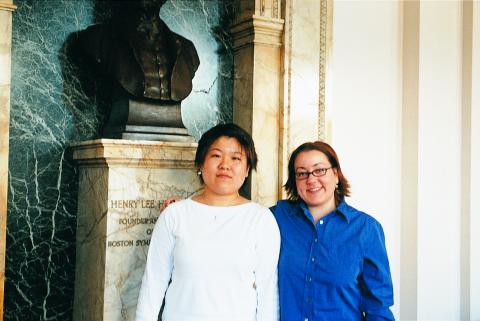Benefits of Interships Flow Both Ways
Coordinator of Experiential Learning

Jennifer Lee'02 (left) is pictured with Margo Sauliner, artistic director for the Boston Pop Orchestra. Lee served as Sauliner's intern during the spring 2002 semester.
In 1999, Berklee created the Office of Experiential Learning (OEL) to offer Berklee students employment opportunities in a wide range of music-related businesses through an internship program. In the three years since its inception, the program, which has placed over 300 student interns with companies, is proving to be a win-win situation. These supervised internships provide companies with highly motivated workers who bring youthful energy, fresh talent, and enthusiasm to the workplace. Student interns benefit from this “real-world” job experience and college credit before entering the job market.
The OEL keeps at the fore the employers’ needs and the career objectives of the students when coordinating a match. Once an intern is selected, employers are responsible for providing a job description or an outline of tasks that the intern is expected to complete. The employer and student then collaborate on a contract specifically crafted to meet the student’s learning objectives and fulfill the company’s needs. That contract is filed with the OEL. It commits the intern to an eight- to 14-week period during which time the intern works a minimum of 140 hours.
The employer should provide the intern with whatever he or she needs to become a contributing member of the organization. Decisions about which projects to assign to interns are left to the employer’s discretion; but interns often work on projects that the employer has been too busy to attend to. Interns frequently shadow the employer in day-to day-activities and are expected to assist with other office duties such as mailing, filing, and faxing. Compensation is encouraged but not required. At the conclusion of the internship, the organization completes an evaluation of the intern’s performance.
Students wishing to participate in the internship program must have completed 50 academic credits and maintain a minimum grade point average of 2.7. After discussing their learning objectives with the OEL staff and receiving clearance from their academic department to participate, students can be placed with a site supervisor.
Throughout the internship, OEL remains in contact with the students via biweekly journal entries written by the students and through OEL staff visits to the internship sites. Students also participate in an internship seminar, which advises interns on professional behavior. Finally, students submit a paper to their academic department chronicling their experience. These requirements ensure that employers receive high-quality, motivated candidates and that the students have an educationally beneficial internship experience.
Bill Stafford of BMG Entertainment, a corporate participant in the program, summed up his experience with interns this way: “Each year we have of interns from colleges and universities across the country working in music licensing in BMG’s Copyright Department. The Berklee interns get a ‘working interview’ here and will continue to be offered full-time positions as opportunities arise.”
Jeremy Black an intern at Capitol Records in Los Angeles, gives the student’s perspective: “My internship enabled me to observe a lot of possible career paths for my future. I got to experience a lot of things that I had no interest in before I came here. I have clearer professional goals now that I’ve seen what I have to do to get where I want to be.”
The OEL is continuing to build the program and expand internship opportunities. Two scholarships, the Justin M. Kantor Scholarship and the Rod Nordell Scholarship, are helping with this expansion. The first—set up by Michael Kantor in the name of his son Justin, a recent Berklee graduate who participated in the internship program—is available to students who are Music Business/Management majors seeking a summer internship. The Kantor scholarship also sponsors a career night with a panel of industry professionals to discuss how individuals can market themselves as artists and employees in the music industry. The Nordell scholarship is not tied to a specific major and is available for both the fall and spring semesters.
The OEL maintains a database of over 700 possible internship site listings; that number however, is always growing. Referrals from Berklee faculty and alumni help the office find new site sponsors. Although most interns work in Boston, New York, Nashville, and Los Angeles, the OEL is seeking contacts in other areas of the country and overseas.
To expand the program, OEL welcomes input from alumni on how to better serve participating students and employers and the office invites companies to submit industry contact information that may generate opportunities for Berklee’s student interns. Those seeking more information on the Berklee internship program or wishing to hire a Berklee intern can contact the Office of Experiential Learning, 1140 Boylston Street, Boston, MA, 02155, 617-747-2180. For information online, visit www.berklee.edu/oel.




